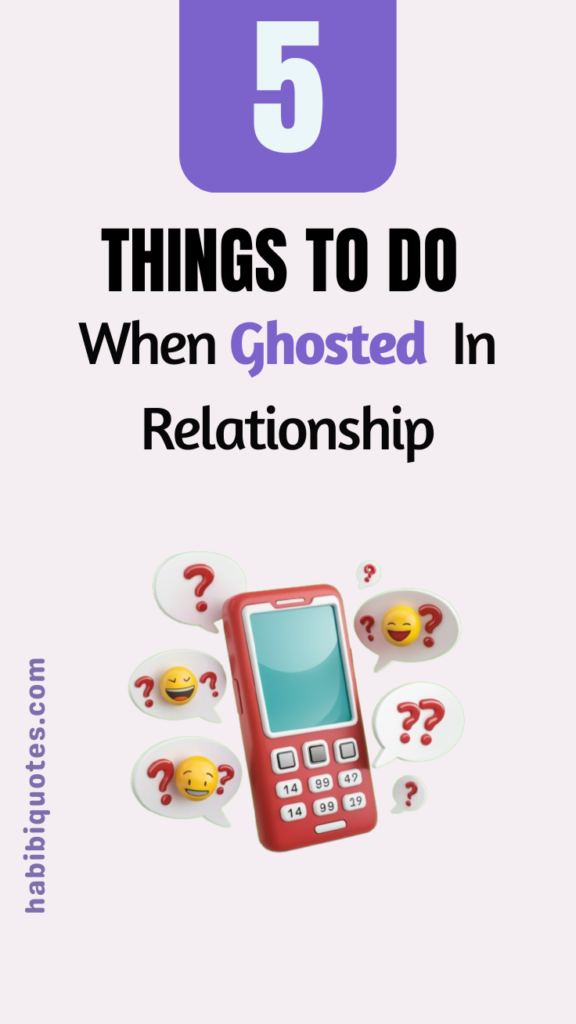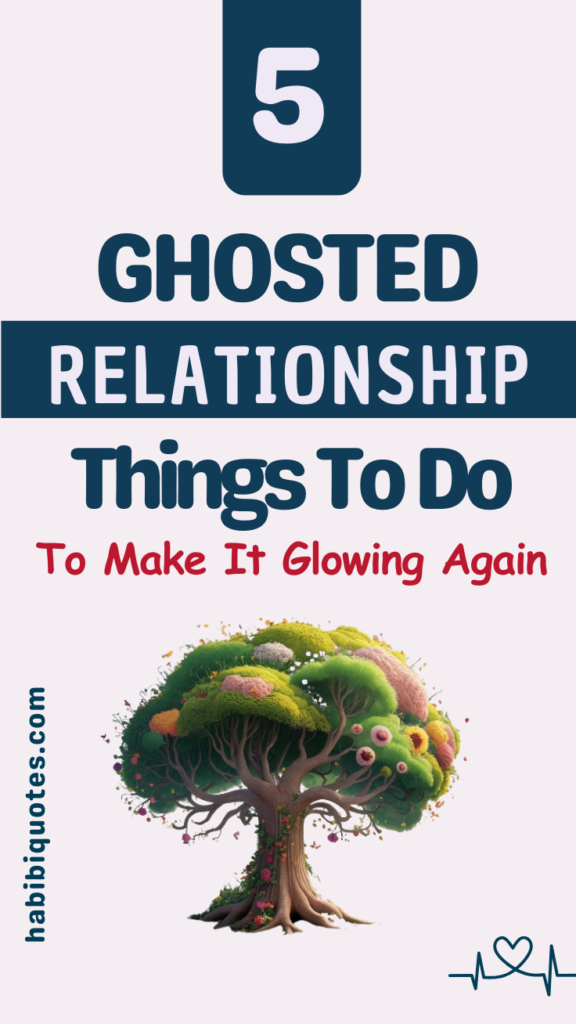Being ghosted in a relationship can be a painful and confusing experience. One day, everything seems to be going well, and the next, your partner has vanished without a trace.
This sudden silence can leave you feeling hurt, rejected, and unsure of what went wrong.
The good news is that there are steps you can take to cope with this situation and move forward.
In this article, I’ll share practical advice on what you can do if you’ve been ghosted in a relationship to help you heal and regain your confidence.

Signs That You’ve Been Ghosted
1. Sudden Silence
One of the clearest indicators of being ghosted is a complete halt in communication.
If someone who was previously attentive suddenly stops responding to your calls, texts, or messages without any explanation, it’s a red flag.
This abrupt silence can be disconcerting and confusing, leaving you wondering what went wrong and why they’ve disappeared.
2. No Social Media Interaction
Another sign is the disappearance from your social media feeds.
If they were active on social media and suddenly vanish, or if they’ve blocked you from viewing their profiles, it can be a sign that they’re trying to cut off all contact.
This is often a way for them to avoid confronting the situation directly and to disengage without any explanation.
3. Cancelled Plans
If your plans are consistently being canceled or rescheduled with vague excuses, it may indicate that they are avoiding you.
Frequent cancellations without a valid reason can suggest a lack of interest or a desire to avoid further interaction.
This behavior is a common tactic used by those who want to end things without having a difficult conversation.
4. Mutual Friends Are Clueless
When mutual friends are unaware of what’s happening or are surprised by the change in your relationship status, it can indicate that the person ghosting you has not communicated any issues or reasons for their behavior.
Their lack of explanation to others often reflects their unwillingness to address the situation directly.
5. Gut Feeling
Trusting your intuition can be crucial. If you have a strong feeling that something is off, your instincts are likely picking up on the subtle signs of being ghosted.
Sometimes, your emotional and psychological cues can sense a change in behavior even before concrete evidence emerges.
What Not To Do When You’re Ghosted
1. Don’t Keep Calling or Texting
Persistently reaching out to someone who has ghosted you can exacerbate your feelings of frustration and desperation.
It’s important to respect their decision to cut off contact and avoid making the situation more painful for yourself by chasing after them.
2. Don’t Stalk Their Social Media
Constantly monitoring their social media accounts can lead to further emotional distress.
This behavior can keep you trapped in a cycle of hope and disappointment and prevent you from moving on.
It’s healthier to focus on your own healing rather than obsessing over their online presence.
3. Don’t Blame Yourself
Being ghosted often reflects more about the other person’s inability to handle relationships than about your own shortcomings.
It’s easy to fall into self-blame but remember that ghosting is a reflection of their issues, not your worth or character.
4. Don’t Seek Revenge
Reacting with anger or attempting to embarrass them can hinder your own healing process.
Revenge tactics can escalate the situation and damage your self-esteem further.
Instead, focus on constructive ways to deal with your emotions and move forward.
5. Don’t Isolate Yourself
Facing the pain of being ghosted alone can be overwhelming.
Reach out to friends, family, or support networks to help you navigate through your feelings.
Sharing your experience and receiving support can provide comfort and perspective, helping you through this challenging time.
Five Things To Do If You’re Ghosted
1. Accept It
Acknowledge that being ghosted is a reflection of the other person’s character and not a measure of your own worth.
Acceptance is the first step towards healing, allowing you to move forward without internalizing the experience as a personal failure.
2. Give Yourself Time to Grieve
Allow yourself to feel and process the pain of being ghosted.
It’s normal to experience a range of emotions, including sadness, confusion, and frustration.
Giving yourself permission to grieve helps in processing the experience and starting the healing journey.
3. Focus on Self-Care
Engage in activities that promote your well-being and happiness.
Exercise, pursue hobbies, and spend time with supportive friends and family.
Prioritizing self-care helps to rebuild your confidence and maintain a positive outlook on life.
4. Talk About It
Sharing your experience with trusted individuals can provide valuable support and perspective.
Discussing your feelings with friends, family, or a therapist can help you process your emotions and gain insights that facilitate healing.
5. Move Forward
Embrace the opportunity to grow from the experience and remain open to new relationships.
Reflect on what you’ve learned about yourself and use those insights to foster healthier connections in the future.
Moving forward with an open heart and mind can lead to more fulfilling and positive interactions.
Conclusion
Being ghosted is undeniably a painful experience, but it does not define who you are.
Recognize the signs, avoid detrimental reactions, and take proactive steps to heal and grow.
By focusing on your well-being and seeking support from others, you can emerge stronger and better prepared for healthier relationships.
Remember, someone who truly values you will not disappear without explanation.
Save For Later!









